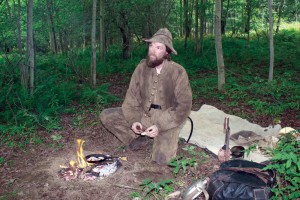BERKSHIRE — Campfire smoke seeped up through the trees in the woods off Reservoir Road in Berkshire, as two soldiers representing the First Tennessee Infantry prepared an afternoon meal of smoked pork Thursday, Aug. 15.

Tyler Goodrich of Berkshire cooks an afternoon meal using authentic Civil War-era food and gear on Thursday.
Tyler Goodrich and his father, David, aren’t exactly lost in place and time; however the two Berkshire men are committed to their roles as Confederate soldiers through the next weekend and like many previous ones.
Unlike many of the re-enactors who will be in St. Albans this weekend for the Civil War Heritage days, the Goodriches are traveling authentically: by foot, from David’s Berkshire home.
The walk is more than 20 miles, mostly on the Missisquoi Valley Rail Trail. They camped under the stars Thursday night, aiming to be around The Abbey in Sheldon by that evening. The plan was to arrive in Taylor Park around the same time other re-enactors started shuffling into St. Albans Friday afternoon.
The Goodriches are longtime Civil War re-enactors, traveling around the country and playing parts on both sides. For the past 15 years, the father and son duo have collected authentic Civil War artifacts and learned how to make their own clothing and gear.
“I think I’ve got more Civil War clothes than regular clothes,” Tyler said. He makes a majority of the uniforms he wears during re-enactments, having learned the craft years ago in North Carolina. He buys authentic Civil War era material and uses templates to create authentic jackets, coats, pants and the rest of the garments they wear. “It’s also cheaper if you make your own stuff,” he said.
Beyond the clothing, Tyler created many of the pair’s leather and canvas bags. Cooking utensils and supplies were either bought or acquired from auctions or online. Referred to as “campaigners, during re-enactments the Goodrich men take pride in living as close to the way Civil War soldiers actually did. A cooking pan Tyler had was made out of a broken canteen he said. Soldiers lived with few luxuries and were often innovative with their supplies.
“They were pretty crafty,” Tyler said.
On Thursday afternoon, before leaving on their march, David wraps up the uncooked salt pork in a cloth. Apples, potatoes and an ear of corn are safely secured in their bags. A loaf of bread — a luxury Tyler said, as soldiers were often only given flour as part of their rations — was skewered on David’s bayonet, a common practice during the Civil War. A roll of plug tobacco joins the food and supplies in David’s bag.
“It’s kind of nasty,” he said as he packs his handmade pipe. “There’s no flavor to it.”
Their two rifles were authentic Civil War weapons. One was commonly issued to the New York regiments, Tyler said, but justified its Confederate possession in that southern soldiers often picked up supplies from battlefields, especially later in the war.
Similar to modern warfare, soldiers from both sides usually had to turn in their government-issued weapons and uniforms after the war, said Tyler, who fought in Iraq in 2003. He said that makes it increasingly difficult and expensive finding the rare artifacts kept by surviving soldiers.
After packing up the campsite and dousing the fire – Tyler said he hunts in these woods, so he’d prefer they don’t burn down – the Goodriches were ready to head down to St. Albans. Their packs on their belt are held high and tight, not dangling down below their waists, as many re-enactors will be seen doing, Tyler said. As the war continued through the 1860s, soldiers stopped placing their personal belonging down before battles. Keeping the gear tight to the body in battle made it slightly easier to move around, he said.
“You may as well do it right,” said Tyler, who estimated 30 to 40 pounds of gear on each of them. “Everybody takes it to a different level.”
Doing it right to the smallest details doesn’t come without a few pains. David hoped his blisters from the old socks and shoes he was wearing won’t break open again this time around. He was hopeful that his clean socks – washed by hand, of course – would ease the pain.
Having clean clothes was another luxury not afforded by soldiers, and the Goodriches’ dedication to authenticity is evident. Their jackets are stained and pants dirty from sleeping on the ground and not having time to regularly clean them. Tyler said it’s astounding how quickly clothing gets dirty and grimy, and remembered his body armor in Iraq, saying the modern fatigues quickly developed a grungy look.
With his long, unkempt beard and shabby clothing, it’s clear why Tyler has developed the nickname “Private Dirty.” He said he read one count of a Confederate unit traveling through a town where the villagers refused to go outside due to the stench of the soldiers.
Walking down to what one was the Old Boston Post Road, it’s clear that the many of years of re-enactments is a father-son bonding activity. David said they really got into the Civil War when he and Tyler spent three days in Gettysburg, walking around all the sites. It was there when they first encountered re-enactors, men dressed in era clothing acting out battle movements.
Family ties
The rest, as they say, is history. With the growth of the Internet, the Goodriches have been able to connect with more fellow re-enactors, along with exploring their own family history.
A strong connection to the Civil War was discovered when they found that an ancestor, Julius Francis Goodrich, was first a drummer with the 13th Vermont Infantry. He later re-enlisted in the Sixth Vermont Infantry, David said. David also found ancestors who fought from his mother’s side of the family.
“That’s why we do it this way,” Tyler said. “It’s a family connection.”
After their first march from Berkshire to St. Albans this year, Tyler said he wants to turn the overnight walk into a larger, fundraising effort. He said he’s received interest for next year from re-enactors from Vermont, New York and Massachusetts. Having traveled through the heart of the Civil War, Tyler said it would be nice to join in efforts to preserve battlefields that are in danger of being developed.
The march also marks David’s impending retirement from re-enacting. A few years away from turning 60, he said he won’t be able to handle the strain of the exhausting effort it takes to be 100 percent authentic. Tyler, ever the reassuring son, mentioned he found records of a few soldiers well into their 50s.
Before heading off the main road, Tyler noted that their march isn’t entirely realistic. The duo would have, in reality, been marching with dozens of other men. Tyler said the dirt road would’ve been kicking up a thick layer of dust, but on Thursday, father and son seemed to enjoy the cool, sunny afternoon, heading off to “battle.”
By IAN LORD
St. Albans Messenger Staff Writer





















